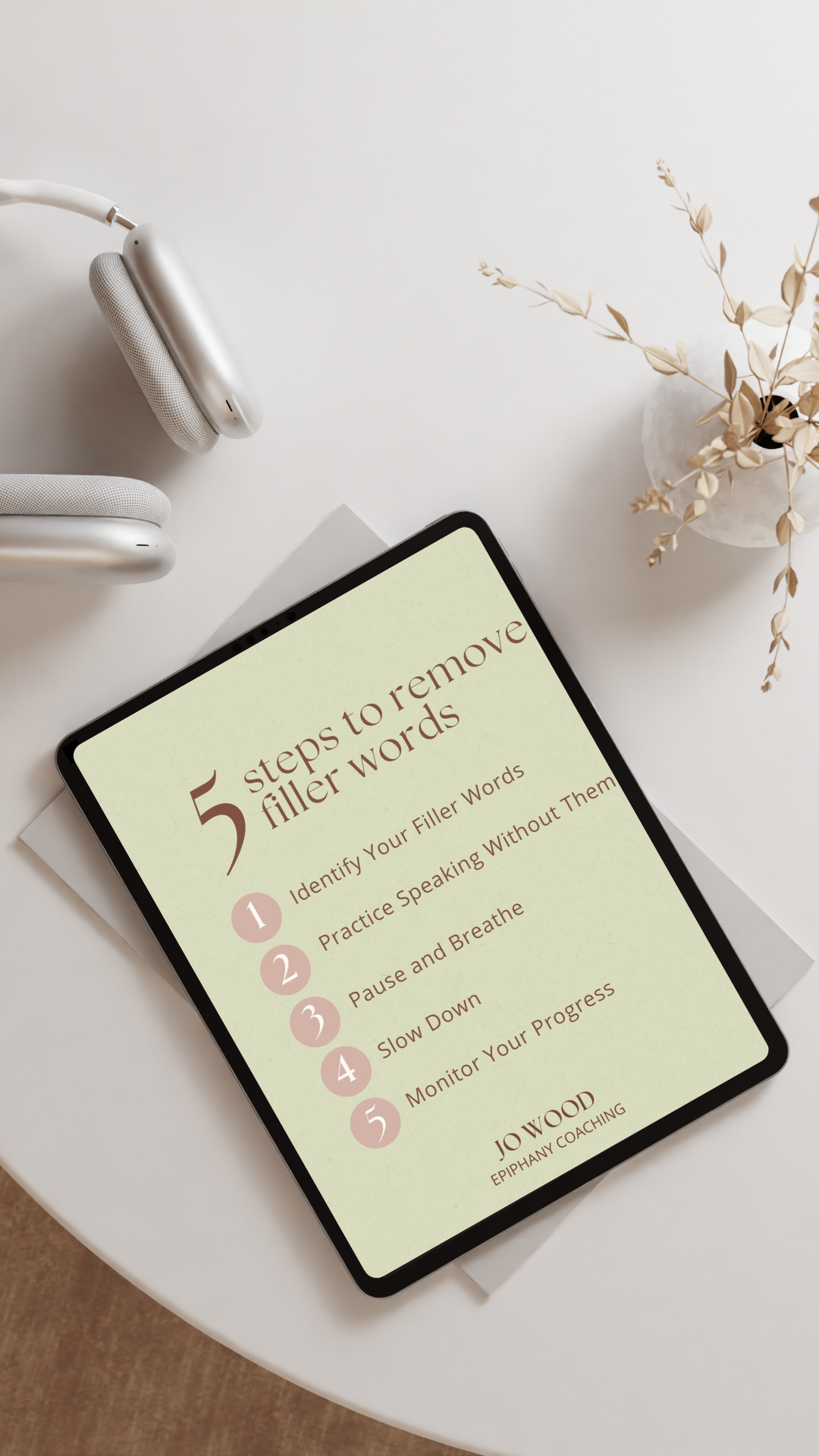If you feel nervous about public speaking then you might have this common verbal tick…. filler words!
How do I get rid of filler words?
Filler words can be distracting, make you sound less confident, and diminish your overall message. But how do you remove words such as “um,” “ah,” and “like” especially when you feel nervous about speaking in public?
Follow these 5 steps to help eliminate filler words and improve your public speaking skills.
Step 1. Identify your Filler Words
Self-awareness is the key to making any lasting change. So, let’s start by paying attention to when and why you use filler words. You can approach this in a few ways. My favourite is to record yourself. Or, ask a trusted colleague or friend to listen next time you’re presenting or speaking publicly.
I know this can feel daunting (especially if you are terrified of public speaking), but trust me it’s worth it. It will help you establish what your main filler words are and understand when you use them most. Maybe it’s when you are nervous or unsure what to say next? Maybe you use them all the time?
Step 2. Practice Speaking without Filler Words
So, if you’re anything like me, you’ve noticed filler words have crept into your everyday speech (never mind when you feel nervous about public speaking!) Don’t worry, this is completely normal. Instead of trying to eliminate all filler words at once, start with one or two.
Practice speaking without these words in everyday conversations, not just in high-pressure situations. This will help you develop a new habit of avoiding filler words.
Step 3. Pause and Breathe
When you start to focus on removing filler words, you’re going to notice them more! Initially, you might not catch them beforehand, but with practice, you’ll become more aware before you use them. This is progress!
When you feel the urge to use a filler word, pause, take a breath, and give yourself a moment to gather your thoughts before continuing. Silence can be a powerful tool when public speaking.
Practice using pauses to collect your thoughts, emphasise important points, and give your audience time to process what you’ve said. In turn, this will naturally reduce the need for filler words and make you a more impactful public speaker.
Step 4. Slow Down
If you are afraid of public speaking you might have a tendency to speak too quickly (you just want to get it over with, I hear you!). But when you speak too quickly, you’re more likely to use filler words because your brain struggles to keep up with your mouth! Generally, a good pace is around 120-150 words per minute.
Don’t go too slow though as that can be just as detrimental as speaking too quickly. You want to find a pace that is comfortable for both you and your audience, allowing you to articulate your thoughts clearly and maintain engagement.
If you think you speak too quickly, try one of these suggestions.
- Record yourself speaking (yes, that again!) and listen back to it. Pay attention to areas where you tend to speak too quickly and make a conscious effort to slow down in those areas.
- Reading out loud can also help you develop a more deliberate speaking style. Choose a passage to read and focus on speaking slowly and clearly. As you become more comfortable, try to incorporate your own thoughts and ideas into your reading.
- You can even try a metronome (it’s a tool used by musicians to keep a steady tempo). Set the metronome to a slower pace and practice speaking along with it.
Step 5. Monitor your Progress
Be patient with yourself—this process takes time! Monitor your progress with a kind heart. If you were brave enough to record yourself then comparing recordings will help you see how far you have come. Alternatively, ask a trusted colleague to note how often you now use filler words.
Don’t be too hard on yourself if you still use some filler words; it’s natural. And remember to celebrate how well you are doing (because recognition is a really important step). You’re on the way to becoming a more confident and credible public speaker….you got this!
Want to overcome nerves when public speaking?
Check out my blog post: Why do I always feel nervous when talking in public?
What other communication mistakes have a big impact on the way women communicate? Find out what Tara Mohr, author of Playing Big thinks in this blog.
Further Support With Public Speaking
If you want public speaking tips, exclusive access to free sessions and advice direct to your inbox then sign up for my monthly newsletter.
If you’re serious about improving your public speaking skills, consider enrolling in one of my public speaking courses. These expert-led courses will help you gain confidence, reduce the fear of public speaking, and become an impactful speaker. Visit my public speaking courses page to learn more and start your journey to confident public speaking today.
Want one-to-one support? Check out my public speaking one-to-one support and start your journey to confident public speaking today.

View comments
+ Leave a comment